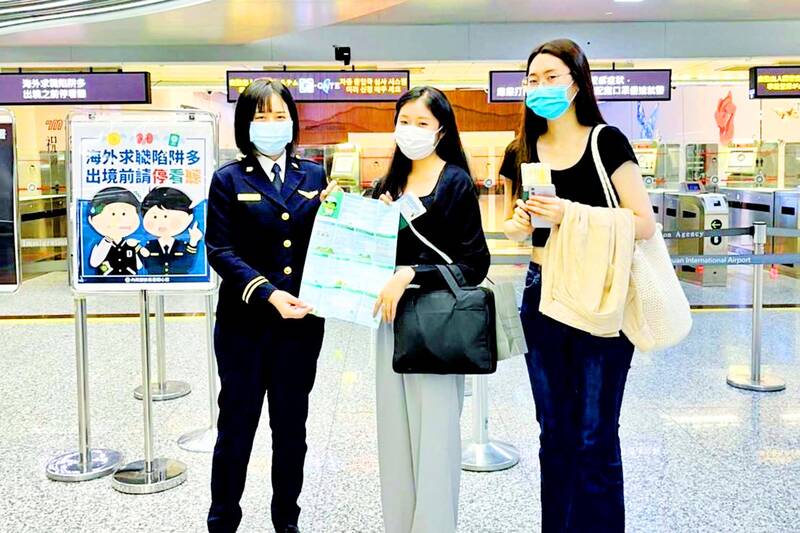Authorities investigating international human trafficking rings have arrested suspects in Taipei, Hsinchu and Kaohsiung this week as they look to help their victims return to Taiwan.
Taipei police said they arrested four suspects they believe work for a group headed by a man surnamed Su (蘇) and seized records indicating that the group had sent 17 young Taiwanese to Cambodia.
Searches were conducted on Monday at several locations in Taipei and other cities after family members of victims gave information to the authorities, said Huang Li-heng (黃立恆), a captain at the Criminal Investigation Division in Taipei.

Photo courtesy of the National Immigration Agency via CNA
“When gathering evidence and tracking down members of this group, we managed to stop a female victim from boarding a flight to Cambodia,” Huang said at a news conference yesterday.
The criminal ring headed by Su had circulated job adverts on social media, which touted high pay and easy work, along with the promise that “we take care of everything for you, including air tickets, accommodation and daily meals.”
Those promises are lies and such adverts target young people who lack social and work experience, Huang said.
“Once the victim arrives in Cambodia, their passport and mobile phone are taken, they are confined and ordered to make calls for telecom scams. They are beaten up if they do not cooperate,” he said.
Among the four people arrested was a woman surnamed Yeh (葉), who was allegedly hired to gain the confidence of women with promises of easy money, as Su’s group specifically targeted young female jobseekers, he said.
“We are working with the families of the 17 victims linked to this case, of which four have been rescued, although they had to pay US$20,000 each to a human trafficking gang in Cambodia... We are doing everything we can to find the other victims and get them home,” Huang said.
Meanwhile, Kaohsiung police said that officers arrested members of a trafficking ring headed by a man surnamed Tsai (蔡), nicknamed “Brother Dan” (丹哥), as well as evidence of them colluding with Cambodian traffickers.
Officers raided locations in Kaohsiung and Pingtung County earlier this week and took five people in for questioning, Kaohsiung Police Captain Hong Sung-tien (洪松田) said yesterday.
Hong said that this human trafficking ring has a clear connection with a Taiwanese man surnamed Liu (劉), a Kaohsiung resident who, when the job scams started receiving publicity, departed with his wife to Cambodia.
“We have gathered evidence that Liu is an important suspect who collaborated with Taiwanese gangsters to send people to Cambodia. The main contact was Brother Dan and Liu would wire US$3,000 commission for each Taiwanese who landed in Cambodia, where Liu’s gang would take over,” Hong said.
Separately, Hsinchu County police arrested a man surnamed Yen (顏), who is suspected of having participated in a scheme to send a 30-year-old woman to Cambodia, who is now reported missing.
A search of Yen’s residence found evidence that he booked the 30-year-old woman’s flight and had contact with the victim, Hsinchu police officer Yang Tsung-kun (楊宗昆) said.
Yen is likely to be charged for contravening the Human Trafficking Prevention Act (人口販運防制法), he said.

The disruption of 941 flights in and out of Taiwan due to China’s large-scale military exercises was no accident, but rather the result of a “quasi-blockade” used to simulate creating the air and sea routes needed for an amphibious landing, a military expert said. The disruptions occurred on Tuesday and lasted about 10 hours as China conducted live-fire drills in the Taiwan Strait. The Civil Aviation Administration (CAA) said the exercises affected 857 international flights and 84 domestic flights, affecting more than 100,000 travelers. Su Tzu-yun (蘇紫雲), a research fellow at the government-sponsored Institute for National Defense and Security Research, said the air

Taiwan is to commence mass production of the Tien Kung (天弓, “Sky Bow”) III, IV and V missiles by the second quarter of this year if the legislature approves the government’s NT$1.25 trillion (US$39.78 billion) special defense budget, an official said yesterday. Commenting on condition of anonymity, a defense official with knowledge of the matter said that the advanced systems are expected to provide crucial capabilities against ballistic and cruise missiles for the proposed “T-Dome,” an advanced, multi-layered air defense network. The Tien Kung III is an air defense missile with a maximum interception altitude of 35km. The Tien Kung IV and V

Trips for more than 100,000 international and domestic air travelers could be disrupted as China launches a military exercise around Taiwan today, Taiwan’s Civil Aviation Administration (CAA) said yesterday. The exercise could affect nearly 900 flights scheduled to enter the Taipei Flight Information Region (FIR) during the exercise window, it added. A notice issued by the Chinese Civil Aviation Administration showed there would be seven temporary zones around the Taiwan Strait which would be used for live-fire exercises, lasting from 8am to 6pm today. All aircraft are prohibited from entering during exercise, it says. Taipei FIR has 14 international air routes and

Taiwan lacks effective and cost-efficient armaments to intercept rockets, making the planned “T-Dome” interception system necessary, two experts said on Tuesday. The concerns were raised after China’s military fired two waves of rockets during live-fire drills around Taiwan on Tuesday, part of two-day exercises code-named “Justice Mission 2025.” The first wave involved 17 rockets launched at 9am from Pingtan in China’s Fujian Province, according to Lieutenant General Hsieh Jih-sheng (謝日升) of the Office of the Deputy Chief of the General Staff for Intelligence at the Ministry of National Defense. Those rockets landed 70 nautical miles (129.6km) northeast of Keelung without flying over Taiwan,